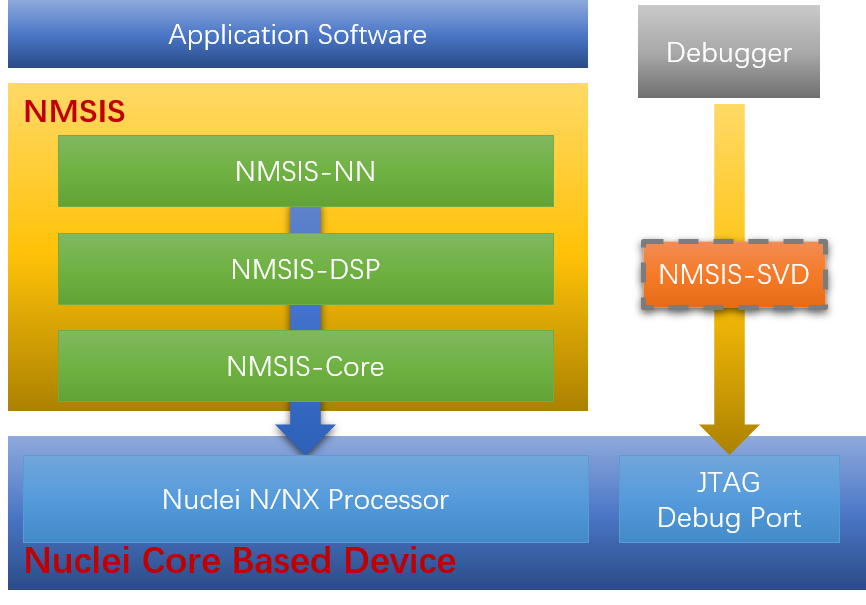Nuclei MCU Software Interface Standard(NMSIS)
About NMSIS
The NMSIS is a vendor-independent hardware abstraction layer for micro-controllers that are based on Nuclei Processors.
The NMSIS defines generic tool interfaces and enables consistent device support. It provides simple software interfaces to the processor and the peripherals, simplifying software re-use, reducing the learning curve for micro-controller developers, and reducing the time to market for new devices.
Note
To get a pdf version of this documentation, please click NMSIS Document
NMSIS Components
- NMSIS CORE
All Nuclei N/NX/UX Class Processors Standardized API for the Nuclei processor core and peripherals.
- NMSIS DSP
All Nuclei N/NX/UX Class Processors DSP library collection with a lot of functions for various data types: fixed-point (fractional q7, q15, q31) and single precision floating-point (32-bit).
- NMSIS NN
All Nuclei N/NX/UX Class Processors Collection of efficient neural network kernels developed to maximize the performance and minimize the memory footprint Nuclei processor cores.
Note
NMSIS DSP/NN library implementations are optimized for the Nuclei Processors which has P-ext or V-ext instruction set.
We also provide other Nuclei Optimized Libraries in other repositories:
NMSIS Design
NMSIS is designed to help the Nuclei N/NX/UX Class Processors processors in standardization. It enables consistent software layers and device support across a wide range of development tools and micro-controllers.
NMSIS is a lightweight software interface layer that tried to standardize common Nuclei processor-based SOC, and it didn’t define any standard peripherals. The silicon industry can therefore support the wide variations of Nuclei processor-based devices with this common standard.

NMSIS Design Diagram
We can achieve the following benefits of NMSIS:
NMSIS reduces the learning curve, development costs, and time-to-market. Developers can write software quicker through a variety of easy-to-use, standardized software interfaces.
Consistent software interfaces improve the software portability and re-usability. Generic software libraries and interfaces provide consistent software framework.
It provides interfaces for debug connectivity, debug peripheral views, software delivery, and device support to reduce time-to-market for new micro-controller deployment.
Being a compiler independent layer, it allows to use the compiler of your choice. Thus, it is supported by mainstream compilers.
It enhances program debugging with peripheral information for debuggers.
How to Access
If you want to access the code of NMSIS, you can visit our opensource NMSIS Github Repository.
Coding Rules
The NMSIS uses the following essential coding rules and conventions:
Compliant with ANSI C (C99) and C++ (C++03).
Uses ANSI C standard data types defined in stdint.h.
Variables and parameters have a complete data type.
Expressions for #define constants are enclosed in parenthesis.
In addition, the NMSIS recommends the following conventions for identifiers:
CAPITAL names to identify Core Registers, Peripheral Registers, and CPU Instructions.
CamelCase names to identify function names and interrupt functions.
Namespace_ prefixes avoid clashes with user identifiers and provide functional groups (i.e. for peripherals, RTOS, or DSP Library).
The NMSIS is documented within the source files with:
Comments that use the C or C++ style.
Doxygen compliant comments, which provide:
brief function, variable, macro overview.
detailed description of the function, variable, macro.
detailed parameter explanation.
detailed information about return values.
Validation
Nuclei uses RISC-V GCC/Clang/IAR Compiler in the various tests of NMSIS, and if more compiler is added, it could be easily supported by following the NMSIS compiler independent layer. For each component, the section Validation describes the scope of the various verifications.
NMSIS components are compatible with a range of C and C++ language standards.
As NMSIS defines API interfaces and functions that scale to a wide range of processors and devices, the scope of the run-time test coverage is limited. However, several components are validated using dedicated test suites.
License
This NMSIS is modified based on open-source project CMSIS to match Nuclei requirements.
This NMSIS is provided free of charge by Nuclei under the Apache 2.0 License.